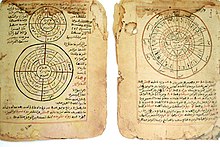Askia Muhammad I: Difference between revisions
Reverted to revision 456431479 by 74.88.47.15: Vandalism. (TW) |
No edit summary |
||
| Line 28: | Line 28: | ||
[[File:SONGHAI empire map.PNG|thumb|right|200px|Extent of the [[Songhai Empire]],<br/>circa 1500.]] |
[[File:SONGHAI empire map.PNG|thumb|right|200px|Extent of the [[Songhai Empire]],<br/>circa 1500.]] |
||
'''Askia the Great''' (ca. 1442 – 1538, also '''Muhammad Toure''', '''Askiya''') was a [[Soninke people|Soninke]] emperor of the [[Songhai Empire]] in the late 15th century, the successor of [[Sunni Ali Ber]]. Askia Muhammad strengthened his country and made it the largest country in [[West Africa]]'s history. At its peak under Muhammad, the Songhai Empire encompassed the [[Hausa people|Hausa]] states as far as [[Kano]] (in present-day [[Nigeria]]) and much of the territory that had belonged to the [[Mali Empire]] in the west. His policies resulted in a rapid expansion of trade with [[Europe]] and [[Asia]], the creation of many schools, and made [[Islam]] an integral part of the empire. |
'''Askia the Great''' (ca. 1442 – 1538, also '''Muhammad Toure''', '''Askiya''') was a [[Soninke people|Soninke]] emperor of the [[Songhai Empire]] in the late 15th century, the successor of [[Sunni Ali Ber]]. Askia Muhammad strengthened his country and made it the largest country in [[West Africa]]'s history. At its peak under Muhammad, the Songhai Empire encompassed the [[Hausa people|Hausa]] states as far as [[Kano]] (in present-day [[Nigeria]]) and much of the territory that had belonged to the [[Mali Empire]] in the west. His policies resulted in a rapid expansion of trade with [[Europe]] and [[Asia]], the creation of many schools, and made [[Islam]] an integral part of the empire.i hate mother fucking snakes. |
||
Due to his efforts, [[Mali]] experienced a cultural revival it had never witnessed before, and the whole land flourished as a center of all things valuable in learning and trade.<ref>[http://www.blackhistorypages.net/pages/askia.php Mohammed I (Askia the Great)] from blackhistorypages.net</ref> Legend has it that he gained the name Askia (which means forceful one) after [[Sunni Ali Ber]]'s daughter heard the news of one of his wars.<ref name="The Name Askia">{{cite web|url=http://www.africanholocaust.net/africanlegends.htm#askia"|title=The Name Askia | publisher=africanholocaust.net}}</ref> |
Due to his efforts, [[Mali]] experienced a cultural revival it had never witnessed before, and the whole land flourished as a center of all things valuable in learning and trade.<ref>[http://www.blackhistorypages.net/pages/askia.php Mohammed I (Askia the Great)] from blackhistorypages.net</ref> Legend has it that he gained the name Askia (which means forceful one) after [[Sunni Ali Ber]]'s daughter heard the news of one of his wars.<ref name="The Name Askia">{{cite web|url=http://www.africanholocaust.net/africanlegends.htm#askia"|title=The Name Askia | publisher=africanholocaust.net}}</ref> |
||
Revision as of 15:14, 5 December 2011
| Askia Mohammed I | |||||
|---|---|---|---|---|---|
| Emperor of the Songhai Empire | |||||
| Reign | 1493 — 1528[1] | ||||
| Predecessor | Sunni Baru (1492-1493) | ||||
| Successor | none | ||||
| Born | ca. 1442 | ||||
| Died | 1538 | ||||
| Burial | |||||
| |||||
| Dynasty | Askia Dynasty or Songhai Empire | ||||

circa 1500.
Askia the Great (ca. 1442 – 1538, also Muhammad Toure, Askiya) was a Soninke emperor of the Songhai Empire in the late 15th century, the successor of Sunni Ali Ber. Askia Muhammad strengthened his country and made it the largest country in West Africa's history. At its peak under Muhammad, the Songhai Empire encompassed the Hausa states as far as Kano (in present-day Nigeria) and much of the territory that had belonged to the Mali Empire in the west. His policies resulted in a rapid expansion of trade with Europe and Asia, the creation of many schools, and made Islam an integral part of the empire.i hate mother fucking snakes.
Due to his efforts, Mali experienced a cultural revival it had never witnessed before, and the whole land flourished as a center of all things valuable in learning and trade.[2] Legend has it that he gained the name Askia (which means forceful one) after Sunni Ali Ber's daughter heard the news of one of his wars.[3]
History

After Sunni Ali Ber died, Sunni Baru, his son and intended successor, refused to declare himself a Muslim. His refusal gave one of Sunni Ali Ber's generals, Muhammad Ture, a reason to challenge the succession.[1] General Toure defeated Sunni Baru and ascended to the throne in 1493.[1]
General Ture, later known as Askia Muhammad I or Askia the Great, subsequently orchestrated a program of expansion and consolidation which extended the empire from Taghaza in the North to the borders of Yatenga in the South; and from Air in the Northeast to Futa Tooro in Guinea. Instead of organizing the empire along Islamic lines, he tempered and improved on the traditional model by instituting a system of bureaucratic government unparalleled in Western Africa.[citation needed] In addition, Askia established standardized trade measures and regulations, and initiated the policing of trade routes. He also established an organized tax system.

Askia encouraged learning and literacy, ensuring that Mali's universities produced the most distinguished scholars, many of whom published significant books. To secure the legitimacy of his usurpation of the Sonni dynasty, Askia Muhammad allied himself with the scholars of Timbuktu, ushering in a golden age in the city for Muslim scholarship.[4] The eminent scholar Ahmed Baba, for example, produced books on Islamic law which are still in use today. Muhammad Kati published Tarik al-Fattah and Abdul-Rahman as-Sadi published Tarik ul-Sudan ("Chronicle of Africa"), two history books which are indispensable to present-day scholars reconstructing African history in the Middle Ages.
Askia has been buried in the Tomb of Askia in Gao, a World Heritage Site.
External links
References
- ^ a b c Biographical information on historical African figures from globaled.org
- ^ Mohammed I (Askia the Great) from blackhistorypages.net
- ^ " "The Name Askia". africanholocaust.net.
- ^ Vogel, Joseph O., Encyclopedia of Precolonial Africa: Archaeology, History, Languages, Cultures, and Environments, page 493 (1997). ISBN 0761989021
